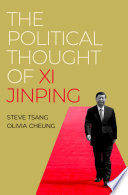

Most ebook files are in PDF format, so you can easily read them using various software such as Foxit Reader or directly on the Google Chrome browser.
Some ebook files are released by publishers in other formats such as .awz, .mobi, .epub, .fb2, etc. You may need to install specific software to read these formats on mobile/PC, such as Calibre.
Please read the tutorial at this link: https://ebookbell.com/faq
We offer FREE conversion to the popular formats you request; however, this may take some time. Therefore, right after payment, please email us, and we will try to provide the service as quickly as possible.
For some exceptional file formats or broken links (if any), please refrain from opening any disputes. Instead, email us first, and we will try to assist within a maximum of 6 hours.
EbookBell Team

0.0
0 reviewsOver the course of the last half dozen years, China's supreme leader Xi Jinping has made extraordinary changes which have profound implications not only for the Chinese people but nations throughout the world. Given how swiftly and fundamentally China's relations with the rest of the world are changing under Xi's rule, it is imperative that we know what Xi Jinping Thought is, how it evolved, and why it is so important.
In The Political Thought of Xi Jinping, Steve Tsang and Olivia Cheung provide an authoritative overview of what "Xi Jinping Thought" is and is not and what it means for both China and the world. Xi, now effectively leader for life, has worked to ensure that "Xi Jinping Thought" becomes cemented as the new state ideology. Clearly inspired by the doctrine of "Mao Zedong Thought," which shaped the parameters of acceptable thinking for a quarter century, Xi wants his doctrine to define what he calls the "China Dream of national rejuvenation" and serve the pathway to its fulfilment by 2050. As Xi conceives it, the China Dream is about making China great again, or restoring China to the height of its power, influence, and international standing in the mythical era of grandeur in its long imperial history. Drawing from original research of Xi's speeches, writings, and policies, Tsang and Cheung conceptualize Xi's vision independently from interpretations provided by the Chinese Communist Party or other sources. They further examine and explain how Xi seeks to transform this vision into reality.